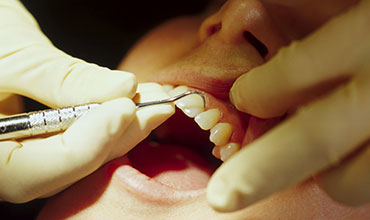Gum Recession

Gum recession is the process in which the margin of the gum tissue that surrounds the teeth wears away, or pulls back, exposing more of the tooth, or the tooth's root. Receding gums may be one of the first signs of gum disease. When gum recession occurs, "pockets," or gaps, form between the teeth and gum line, making it easy for disease-causing bacteria to build up. If left untreated, the supporting tissue and bone structures of the teeth can be severely damaged, and may ultimately result in tooth loss.
Gum recession is a common dental problem. Most people don't know they have gum recession because it occurs gradually. The first sign of gum recession is usually tooth sensitivity, or you may notice a tooth looks longer than normal. Often a notch can be felt near the gum line.
Gum recession is not something you want to ignore. If you think your gums are receding, make an appointment with your dentist. There are treatments that can repair the gum and prevent further damage.
Why do gums recede?
- Periodontal diseases. These are bacterial gum infections that destroy gum tissue and supporting bone that hold your teeth in place. Gum disease is the main cause of gum recession.
- Your genes. Some people may be more susceptible to gum disease. In fact, studies show that 30% of the population may be predisposed to gum disease, regardless of how well they care for their teeth.
- Aggressive tooth brushing. If you brush your teeth too hard or the wrong way, it can cause the enamel on your teeth to wear away and your gums to recede.
- Insufficient dental care. Inadequate brushing and flossing makes it easy for plaque to turn into calculus (tartar) -- a hard substance that can only be removed by a professional dental cleaning -- and build up on and in between your teeth, causing gum recession.
- Hormonal changes. Fluctuations in female hormone levels during a woman's lifetime, such as in puberty, pregnancy, and menopause, can make gums more sensitive and more vulnerable to gum recession.
- Tobacco products. Tobacco users are more likely to have sticky plaque on their teeth that is difficult to remove, which can cause gum recession.
- Grinding and clenching your teeth. Clenching or grinding your teeth can put too much force on the teeth, causing gums to recede.
- Crooked teeth or a misaligned bite. When teeth do not come together evenly, too much force can be placed on the gums and bone, allowing gums to recede.
- Body piercing of the lip or tongue. Jewelry can rub the gums and irritate them to the point that gum tissue is worn away.
